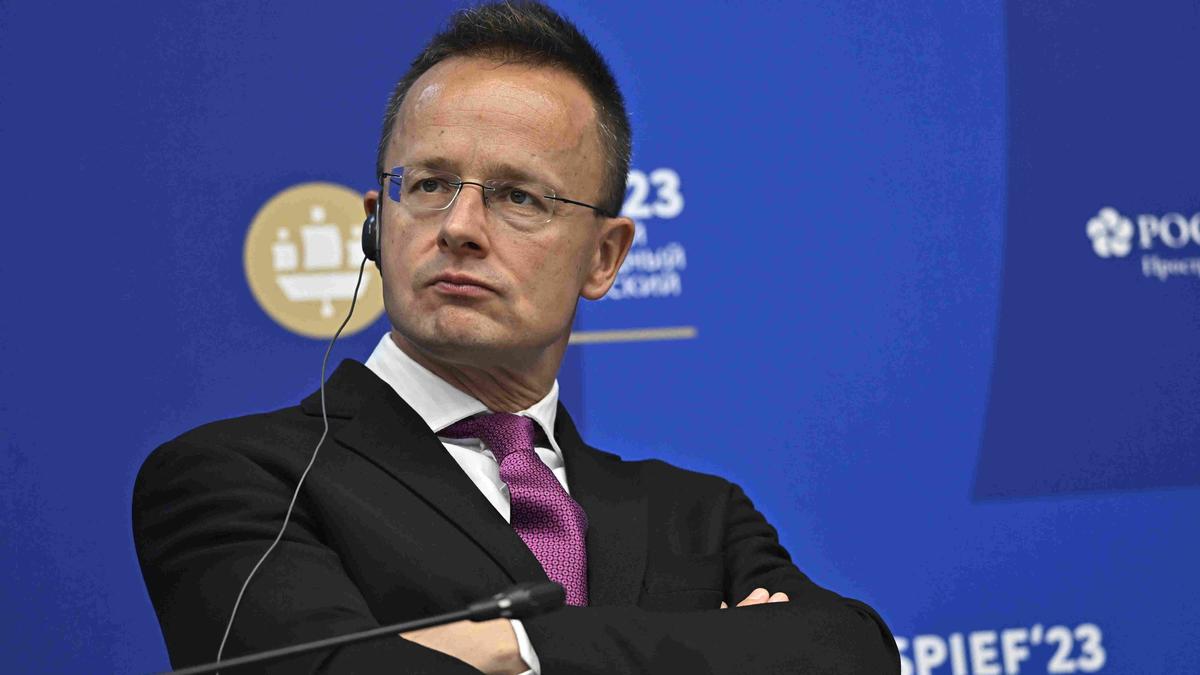This article was originally published by EUobserver.
Hungary’s foreign minister was the best-known European VIP at the St. Petersburg economic forum this year, highlighting how far Russia’s one-time bid to rival Davos has gone downhill.
St Petersburg’s odd assortment of speakers from Austria and Germany told the same tale.
In mid-June, as EU diplomats were finalising the 11th round of Russia sanctions in Brussels, Russian President Vladimir Putin was hosting the St. Petersburg International Economic Forum (SPIEF). The event ran 14-17 June.
SPIEF is Putin’s personal initiative: he revived it in 2005 as Russia’s alternative to the Davos World Economic Forum in Switzerland.
Even back then, he was already nervous about Russian businessmen and officials traveling abroad to discuss internal affairs.
But for all that, the “Russian Davos” was meant to show the West the Kremlin’s business-friendly and pragmatic face.
It was of paramount political value to Putin that high-ranking politicians and industrialists, particularly from EU countries, came along.
And several European leaders did go, prior to Russia’s annexation of Crimea in 2014.
Then-German Chancellor Angela Merkel and Dutch Prime Minister Mark Rutte went in 2013 in SPIEF’s golden age.
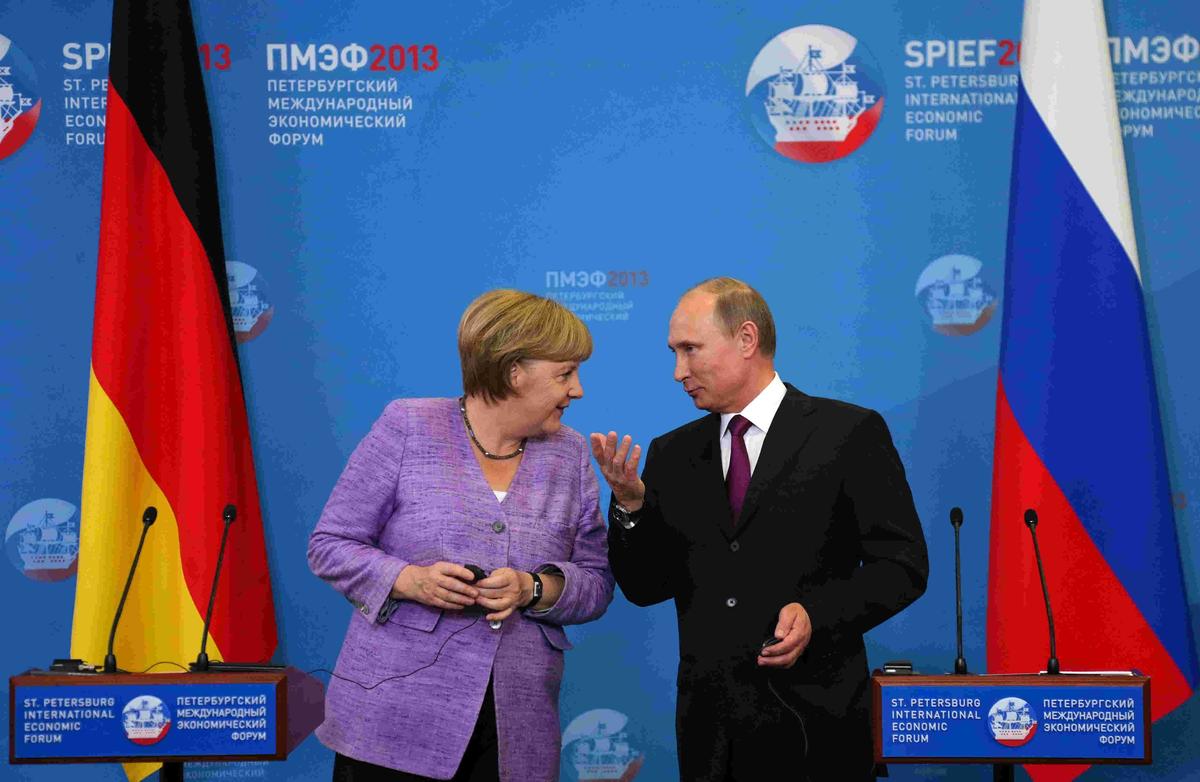
Vladimir Putin and Angela Merkel during the International Economic Forum in St. Petersburg, Russia, 21 June 2013. Phoho: EPA / ANATOLY MALTSEV / POOL
Its old guest list also includes then-French President Nicola Sarkozy (2010) and Norwegian Prime Minister Jens Stoltenberg (2007) — before Stoltenberg became NATO secretary general, and one of Putin’s staunchest critics.
French President Emmanuel Macron (2018) was the only EU leader who attended the forum after the Crimea annexation, however.
Meanwhile, China, India, and other BRICS-bloc countries also stopped sending top people after Putin invaded Ukraine last year.
And Algerian president Abdelmadjid Tebboune was the only foreign leader who participated in a plenary session with Putin at SPIEF 2023.
In fact, even finding a moderator for the plenary discussion these days isn’t like it used to be.
In pre-war times, Putin’s central panel was moderated by journalists from world-class broadcasters, such as US firms Bloomberg, CNN, or NBC.
One of the options this year was disgraced US former Fox News host Tucker Carlson.
But in the end, Putin went with Dimitri Simes, a Russian-American political analyst who has a talk show on Russian TV.
SPIEF programmes in the years 2010 to 2021 used to include buzzy, crowded sessions on topics such as “Russia-France” and “Russia-Germany” relations.
But the 2023 sessions, such as “Russia-Algeria” and “Russia-Brazil”, also showed how things have changed.
And aside from the Hungarian Foreign Minister, Péter Szijjártó, the only other well-known EU panellist was a former Austrian foreign minister, Karin Kneissl, who made headlines in 2018 when she waltzed with Putin at her Alpine wedding.
EUobserver profiles seven of the main EU talking-heads at SPIEF 2023, in an insight into how Putin tries to use his remaining European friends to keep his Davos narrative going.
The others include German musicians and obscure Austrian bloggers.
And the low status of SPIEF’s Russia-friendly EU faces shows the damage Putin’s war has caused to normal relations.
Foreign minister of Russia’s last EU ally
Szijjártó’s appearance at SPIEF 2023 marked his seventh at the annual forum.
The Hungarian minister took part in just one session, about the future of energy in the 21st century, moderated by Sergey Brilev, a Russian propagandist with British citizenship.
Brilev tried to get Szijjártó talking about the imputed unprofitability of the EU shift from Russian oil and gas to alternative energy sources.
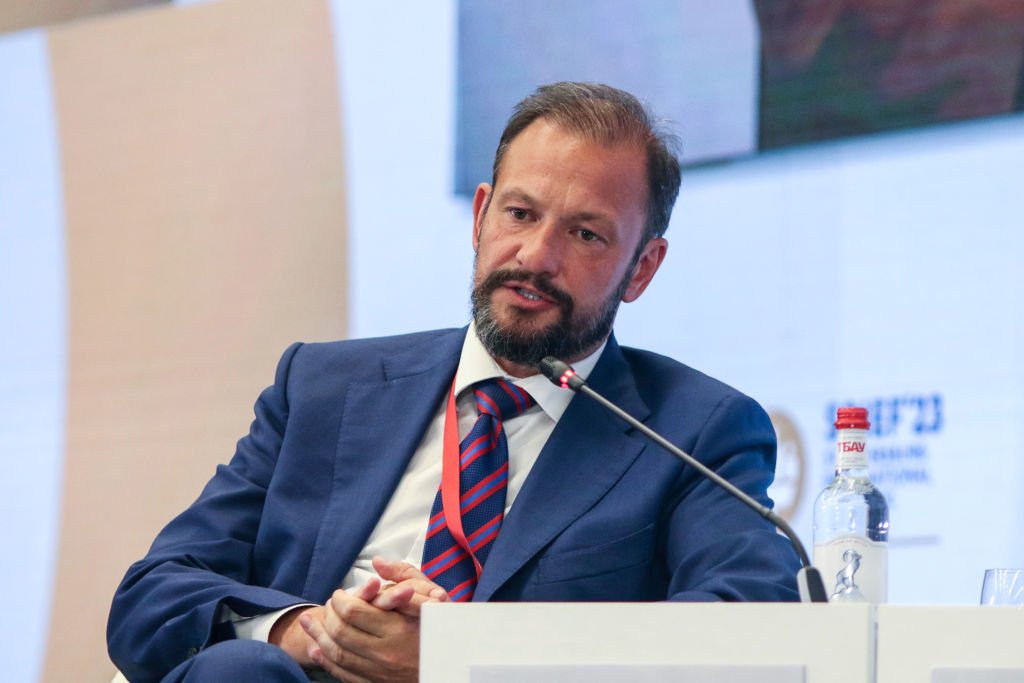
Sergey Brilev, President, The Global Energy Association, attends a session on "Russia Latin America" during the St. Petersburg International Economic Forum 2023. Photo: Maksim Konstantinov / SOPA Images / LightRocket / Getty Images
Szijjártó didn’t take the bait, but criticised the EU for allegedly politicising energy supplies.
Hungary still buys Russian gas. And Szijjártó also boasted it already had 37 percent of the required annual gas reserves in its storage facilities, surpassing the European average of 21 percent.
He was at the forum briefly and did not participate in any other sessions or events, according to sources in the SPIEF organising team.
He also skipped a session by Russian nuclear giant Rosatom, even though it is currently building new reactors in Hungary in a pre-war deal.
Putin’s dancing queen
Kneissl was Austrian foreign minister from 2017 to 2019 and famously danced with Putin while still in office.
She also played a much bigger role than Szijjártó at SPIEF 2023, taking part in four sessions, which made her the de facto main European VIP, even though she now lives in Lebanon.
She began with a business breakfast organised by a Russian group called “Znanie” (Knowledge), which arranges science lectures for young Russians. The lectures are chaired by Russian officials and actors who act as Kremlin propaganda mouthpieces, under a banner with Russia’s pro-war “Z” logo.
In one SPIEF 2023 panel, chaired by former Russian culture minister and diplomat Vladimir Medinsky, Kneissl voiced her dedication to learning the Russian language to gain a deeper understanding of the “Russian world” which intrigued her.
She also introduced a new research centre, called the Geopolitical Observatory for Russia’s Key Issues (G.O.R.K.I.), created at St Petersburg State University, Putin’s alma mater (a point she specifically underlined).
Gorki, which has over 20 experts including four covering Europe, will study Russia’s economy, demographics, energy independence, and “visionary diplomacy”, Kneissl said.
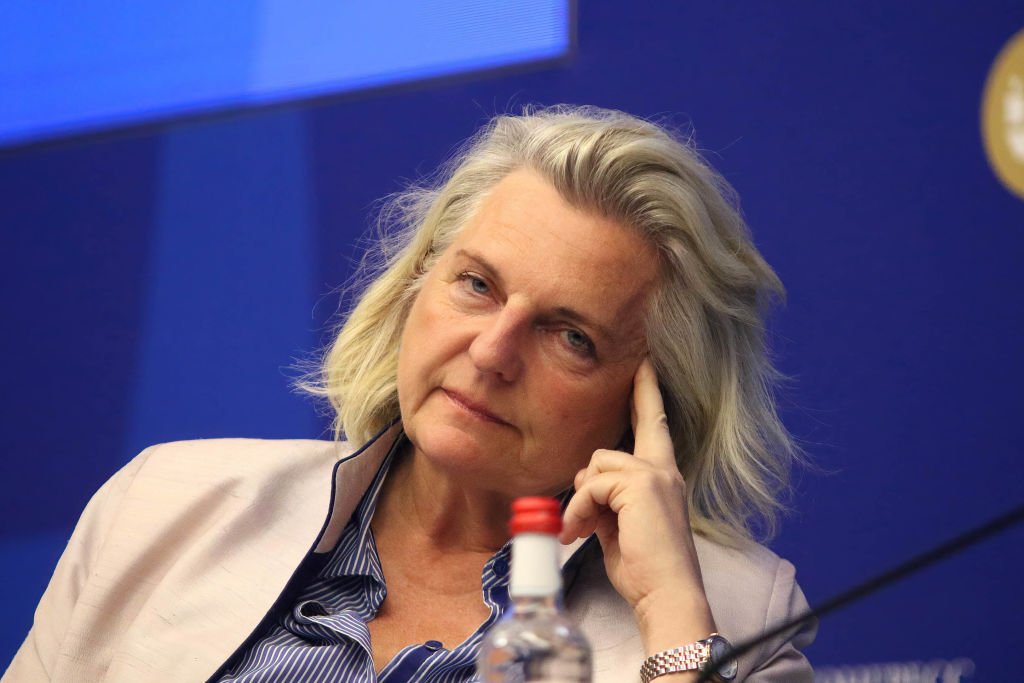
Karin Kneissl, Minister of Foreign Affairs of the Republic of Austria (2017-2019), attends the St. Petersburg International Economic Forum 2023. Photo: Maksim Konstantinov / SOPA Images / LightRocket / Getty Images
Ghost of Dresden KGB past
A third EU guest was German-born art impresario Hans-Joachim Frey, who took Russian citizenship in 2021, lives in Sochi, Russia, and seldom visits Europe.
Frey is known for having revived the Dresden Opera Ball, where he honoured Putin (who used to be a KGB spy in Dresden during the Cold War) with an award in 2009.
Along with several other German public figures, Frey signed a 2014 letter justifying Putin’s annexation of Crimea and deployment of Russian forces in Ukraine’s Donbas region.
He later became art director at Sirus, a Putin-linked musical centre of excellence, which staged performances in Russian regional capitals, and was given a medal by the Russian leader in 2021.
Speaking at SPIEF 2023 sessions, Frey attacked the EU and US for “cancelling Russian culture”.
German people genuinely desired “peace and good relations with Russia,” but the government of chancellor Olaf Scholz was standing in their way, Frey told one panel, featuring Russian Foreign Ministry Spokeswoman Maria Zakharova and Putin’s former son-in-law Kirill Shamalov.
Frey told an anecdote about European Commission president Ursula von der Leyen meant to show EU hypocrisy.
Back in 2019, von der Leyen and Frey went together to a performance by Russian ballerina Svetlana Zakharova from the Bolshoi Theatre in Moscow, he said.
“That’s genius! Only Russians can perform like that. Russian artists are the best,” von der Leyen exclaimed afterward, according to Frey. But the next day she went to the Munich Security Conference where she backed increased pressure on Russia by NATO, Frey added.
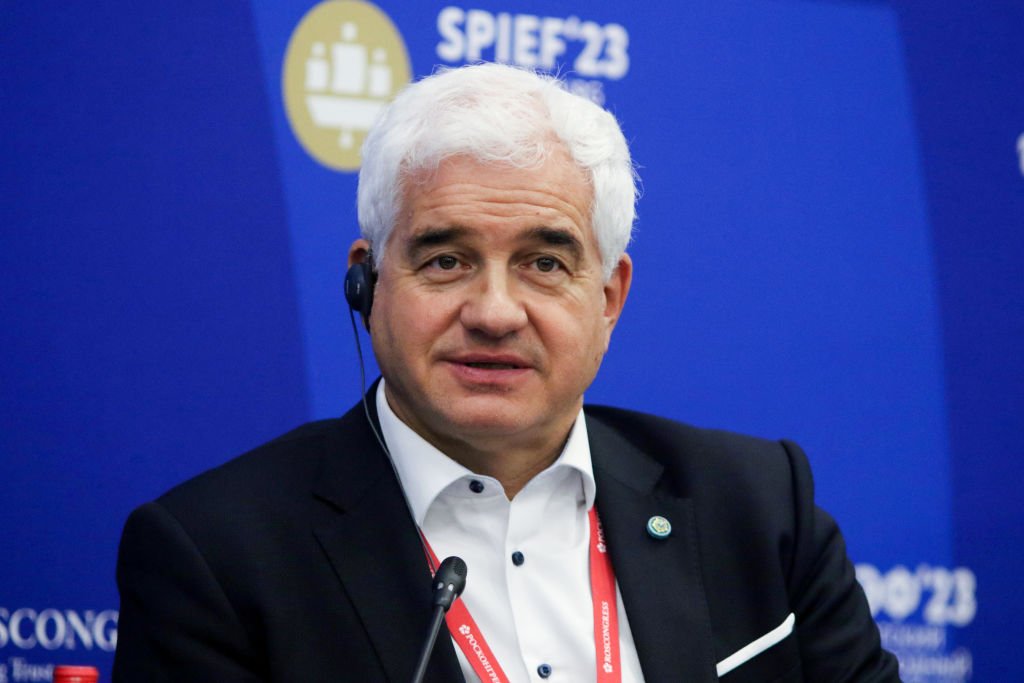
Hans-Joachim Frey, Artistic Director, Talent and Success Foundation, attends the St. Petersburg International Economic Forum 2023. Photo: Maksim Konstantinov / SOPA Images / LightRocket / Getty Images
Crimea bandleader
German pianist and composer Justus Frantz came to St Petersburg as another ambassador of European culture.
Frantz also signed the 2014 German letter on Crimea annexation and gave concerts in the Russian-occupied Crimean cities of Simferopol and Sevastopol four years later.
And in February 2023, he was one of the first German cultural figures to sign an online petition urging Scholz to stop supplying arms to Ukraine.
He took part in just one session at SPIEF 2023, where he avoided direct criticism of the EU.
Frantz instead spoke about cultural diplomacy and recalled a Soviet-German music festival which he organised in the 1980s.
He also praised Russian musical venues for letting German and other European artists keep playing there since the 2022 Ukraine war began.
Russian media darling
A fifth EU guest, German MP Matthias Moosdorf from the pro-Russia and anti-EU AfD party, is often quoted in Russian state media outlets.
Moosdorf has called for a ban on the training of the Ukrainian military on German territory, curbs on Ukraine arms supplies, and a return to dialogue with Russia.
He is also a cellist whose string quartet used to give concerts in Russia and he took part in one panel at SPIEF 2023, on the “dialogue of cultures”.
Moosdorf repeated Kneissl, Frey, and Frantz’s lines on the purported abolition of Russian culture in Western countries.
He added that, on this visit to Russia, he met many old and new friends and was going to tell the Western public that everything was fine in Russia and that the German and European media were broadcasting an incorrect picture of what was going on in the country.
Swiss business envoy
Not a single representative from an EU company spoke at any of the SPIEF 2023 panels.
That meant the entire European business sector was nominally represented by Tadzio Schilling, the Swiss CEO of the Association of European Businesses (AEB).
AEB was registered in Russia in 1995, but there were no major European companies in its list of founders or partners as of 2023.
Schilling took over the leadership of the association three years ago and has made several audacious claims since the Ukraine war — for instance, that EU companies which had left Russia now wanted to come back.
Schilling participated in five SPIEF 2023 panel discussions, including the main economic session with the Russian finance minister.
He expressed gratitude to the ministry of finance and the tax service for their openness to dialogue.
Austrian blogger
Meanwhile, the seventh European speaker, Martin Held, was an unknown Austrian blogger and IT-firm manager, who moved to Russia years ago and who suddenly gained attention in Russian state media in April 2023.
Held made the news when he claimed that 30,000 German-speaking Europeans would relocate to Russia in the next two years, citing reasons such as “LGBT propaganda and Russophobia” as factors driving their decision.
This was based on his own back-of-the-envelope research on social media.
But his expertise was deemed important enough to see him invited to Putin’s St Petersburg extravaganza for a panel entitled “From Brain Drain to Inflow: Why Europeans are Choosing Russia?”
No other Europeans participated in the panel, which included Australians and Americans who had relocated to Russia long ago.
But Held said he had done so because he couldn’t find qualified programmers for his IT firms in Austria.
This was why he moved to Krasnodar, a city of one million people in southern Russia, he said.
Krasnodar is the best place for any IT-specialist to live, because “IT-developers don’t really want to develop programmes, they want to develop their lives” and the Krasnodar region’s natural attractions were ideal for that, Held told SPIEF 2023.
Join us in rebuilding Novaya Gazeta Europe
The Russian government has banned independent media. We were forced to leave our country in order to keep doing our job, telling our readers about what is going on Russia, Ukraine and Europe.
We will continue fighting against warfare and dictatorship. We believe that freedom of speech is the most efficient antidote against tyranny. Support us financially to help us fight for peace and freedom.
By clicking the Support button, you agree to the processing of your personal data.
To cancel a regular donation, please write to [email protected]
